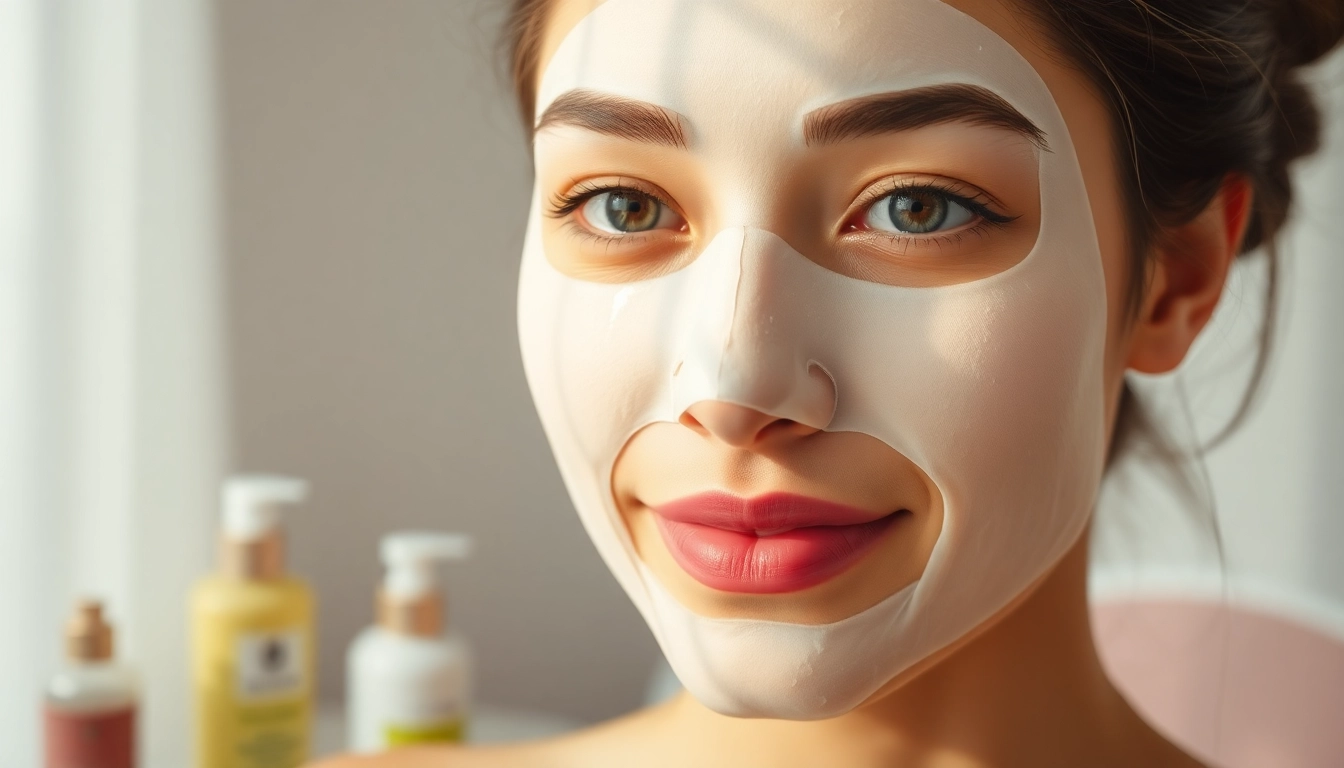What is a Sheet Mask?
Definition and Purpose
A sheet mask is a fabric or paper mask that has been infused with a concentrated serum designed to target various skin concerns. This beauty staple has gained immense popularity within skincare routines, primarily because of its ease of use and instant hydrating effects. The sheet mask covers the entire face, allowing for an effective delivery of vitamins, minerals, and other beneficial ingredients directly to the skin. Unlike traditional masks that may need to be washed off after a period, sheet masks are designed to be left on the skin for a set duration, usually ranging from 15 to 30 minutes, allowing the ingredients to penetrate deeply.
Benefits of Using Sheet Masks
Sheet masks offer a plethora of benefits that cater to various skin types and concerns:
- Hydration: One of the primary benefits of sheet masks is their ability to provide intense hydration. Most masks are saturated with serums that boast a high content of hyaluronic acid, glycerin, or other emollients that help retain moisture in the skin.
- Convenience: Their pre-cut design makes application straightforward and mess-free, eliminating the hassle often associated with traditional face masks.
- Targeted Treatments: Whether you’re looking to brighten your skin, reduce signs of aging, or relieve acne, sheet masks are available in a variety of formulas catering to specific skincare needs.
- Quick Results: Users often see immediate improvements in their skin’s texture and hydration levels after just one application, making sheet masks an excellent option for a quick refresh before a special occasion.
- Relaxation: Incorporating a sheet mask into your skincare routine creates a spa-like experience, promoting relaxation and self-care.
Types of Sheet Masks Available
Sheet masks come in various types, each catering to specific skin concerns:
- Hydrating Masks: Typically loaded with ingredients like hyaluronic acid, these masks are perfect for dry and dehydrated skin.
- Brightening Masks: Formulated with vitamins and extracts, such as vitamin C or niacinamide, these masks aim to improve skin tone and radiance.
- Anti-Aging Masks: Containing peptides or retinol, these masks target fine lines and sagging skin, promoting a youthful appearance.
- Calming Masks: Ideal for sensitive or irritated skin, these masks often include soothing ingredients like aloe vera or chamomile.
- Exfoliating Masks: Some masks incorporate exfoliating agents to help remove dead skin cells and enhance skin texture.
How to Choose the Right Sheet Mask for Your Skin
Understanding Your Skin Type
Choosing the right sheet mask begins with understanding your unique skin type. Here’s how to identify your skin type:
- Dry Skin: Often feels tight or flaky; look for masks with hydrating ingredients.
- Oily Skin: Prone to shine and breakouts; seek out masks that are oil-free and contain purifying ingredients.
- Combination Skin: A mix of both dry and oily areas; a balancing mask that addresses both issues is ideal.
- Sensitive Skin: Easily irritated; opt for calming masks with fewer synthetic ingredients.
Ingredients to Look For in Sheet Masks
Beyond knowing your skin type, being aware of beneficial ingredients can help you choose the right product:
- Hyaluronic Acid: Excellent for hydration and moisture retention.
- Vitamin C: Brightens skin tone and reduces signs of aging.
- Aloe Vera: Soothes and calms irritated skin.
- Collagen: Helps to plump skin and reduce the appearance of wrinkles.
- Green Tea Extract: Offers antioxidant properties and reduces redness.
Common Sheet Mask Mistakes to Avoid
While sheet masks can be incredibly beneficial, users often make common mistakes that can hinder their effectiveness:
- Not Cleaning Your Face: Applying a sheet mask on dirty skin can prevent absorption of the beneficial ingredients.
- Leaving It On Too Long: While sheet masks are designed for prolonged wear, exceeding the recommended time can lead to the mask drying out and pulling moisture back from the skin.
- Ignoring the Neck: Don’t forget to apply leftover serum to your neck and décolletage, as these areas can also benefit from hydration.
- Rushing Post-Mask Skincare: Using heavy creams immediately after can interfere with the mask’s benefits. Instead, apply lighter products to allow your skin to breathe.
Step-by-Step Guide to Using a Sheet Mask
Preparation Before Application
Proper preparation enhances the sheet mask experience. Here’s a simple checklist:
- Cleanse: Begin with a gentle cleanser to remove dirt, oil, and makeup.
- Exfoliate (Optional): For heightened effect, exfoliate to remove dead skin cells, allowing for better absorption.
- Tone: Use a toner to balance skin pH and prepare skin for heightened absorption of the serum.
Correct Application Techniques
Once prepared, follow these steps for optimal application:
- Unpack Carefully: Open the mask package and carefully unfold it to avoid tearing the delicate material.
- Align: Center the mask on your face, aligning the eye, nose, and mouth holes with your features.
- Smooth It Out: Ensure the mask adheres well to your skin, smoothing it out with your fingers to eliminate air pockets.
Post-Mask Care for Optimal Results
After removing the mask, follow these important guidelines to lock in the benefits:
- Pat, Don’t Rub: Gently pat the remaining serum into your skin for maximum absorption.
- Moisturize: Apply a hydrating moisturizer to seal in the benefits of the mask and provide an added layer of hydration.
- Stay Hydrated: Drink water to keep your skin and body hydrated from the inside out.
Top Sheet Mask Recommendations for Every Budget
Affordable Options That Deliver
If you’re on a budget, numerous sheet masks provide outstanding results without breaking the bank. Here are a few you should consider:
- The Face Shop Real Nature Masks: Affordable and effective, available in a variety of formulations for different skin types.
- Innisfree It’s Real Squeeze Mask: Known for its natural ingredients, these masks deliver excellent hydration and care.
- Neutrogena Hydro Boost Hydrating Gel Mask: A budget-friendly option that offers overnight hydration and is suitable for all skin types.
Mid-Range Sheet Masks for Everyday Use
For a slight increase in investment, these mid-range masks combine quality ingredients with great results:
- Dr. Jart+ Dermask Water Jet Vital Hydra Solution: Features deep hydration and nutrient infusion for revitalized skin.
- MediHeal N.M.F Aquaring Ampoule Mask: Provides long-lasting hydration with active ingredients that benefit dry skin types.
- Comfort Zone Hydramemory Mask: A rejuvenating mask that balances hydration without a greasy finish.
Luxury Sheet Masks Worth the Investment
When you’re willing to splurge, these luxury sheet masks offer indulgent experiences with noticeable results:
- SK-II Facial Treatment Mask: Known for its premium Pitera essence, this mask deeply hydrates and revives dull skin.
- Estée Lauder Advanced Night Repair Concentrated Recovery PowerFoil Mask: Contains an advanced serum to accelerate skin recovery and support youthful vitality.
- Biossance Squalane + Omega Repair Mask: Rich in nutrients, this mask promotes barrier repair and locks in moisture.
Frequently Asked Questions About Sheet Masks
How Often Should I Use a Sheet Mask?
The frequency of using sheet masks can depend on individual skin types and concerns. Generally, it is safe to use sheet masks two to three times a week. However, those with dry skin may benefit from more frequent use, while those with oily or acne-prone skin might find that using them once a week works better for them. Listening to your skin’s needs is crucial to avoid potential irritation or over-hydration.
Can Sheet Masks Replace My Regular Skincare Routine?
Sheet masks are designed to complement your skincare routine, not replace it. While they can provide a boost of hydration and targeted treatment, they do not contain all the necessary ingredients that a complete skincare regimen would have, such as sunscreen and daily moisturizers. To achieve optimal skin health, it is important to incorporate sheet masks along with your regular cleansers, toners, and moisturizers.
Are There Any Risks Associated with Sheet Masks?
While sheet masks are generally safe for most skin types, there are some minor risks to consider. People with sensitive skin can experience allergic reactions to certain mask ingredients, so it’s advisable to conduct a patch test first. Additionally, overuse of sheet masks can lead to skin irritation or breakouts due to excess moisture. Always read labels and choose masks that cater specifically to your skin types, such as hypoallergenic options for sensitive skin.



